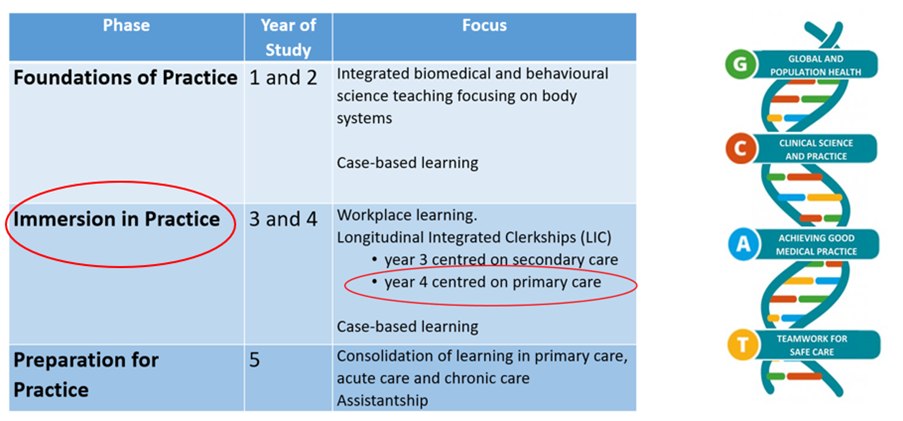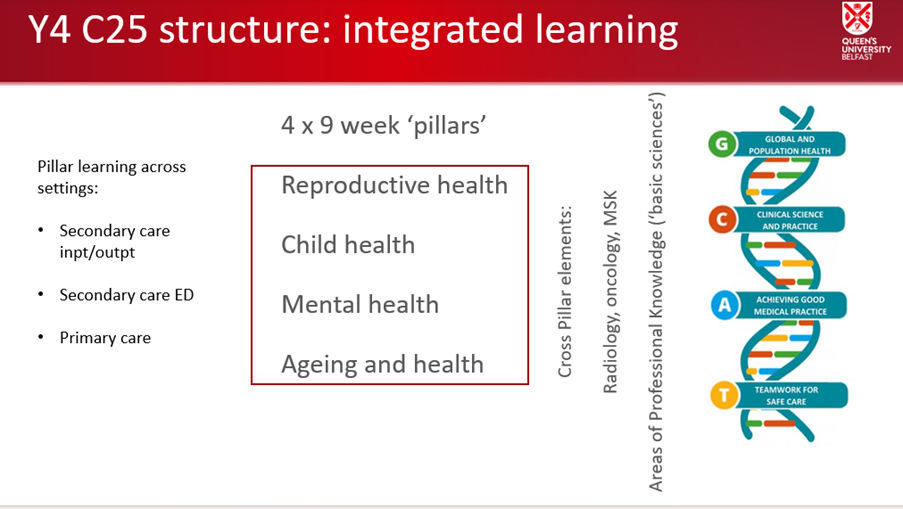General Practice
C25 is the new medical curriculum at QUB – so called as the first cohort to follow this curriculum (who started in September 2020) will graduate as doctors in 2025.
The Tutor/Student guide is available at this link Year 4 GP Tutor and Student Guide
This link provides guidance on MyProgress sign off Signing off Year 4 pillar GP placement
This website also has general information on MyProgress
A Feedback session was held with current year 4 tutors in October 2023 which you can watch at this link. Year 4 Feedback session C25 GP placement
Password is the same as all videos on this website (same as GPNI videos)
Structure of Year
This is the students’ second ‘immersion in practice’ year, and their continuity comes from their ‘home’ GP practice. This is in contrast with year 3 where the majority of their clinical time has been in hospitals. Y4 students will return to their home practice four times through the academic year, for two weeks at a time (total eight weeks clinical GP learning time per student).

These two week blocks are at fixed time points between end of August and mid-May, and ideally Y4 students are paired for their practice placements. This offers benefits to both students and practices. Students can ‘buddy up’ in activities and support one another, and the experience of practices hosting pairs of students has very much been that it represents double the money but is certainly not double the effort! A practice can offer to host up to four pairs of students through the academic year – and the times these pairs are with you in practice won’t overlap.

Rather than Year 4 "block" attachments of old, students will rotate through four lifecycle pillars, based around reproductive health, child health, mental health and ageing and health. Each pillar will commence with a QUB taught ‘pillar week’ – designed and delivered between relevant secondary and primary care colleagues. Each pillar then follows a similar model with five weeks total time in the relevant secondary care specialty area, and three weeks generalist learning; two weeks in GP and one in ED. Some clinical disciplines such as radiology and basic sciences underpinning clinical practice will be distributed through all pillars. Students will be based in a single Trust area for the vast majority of their hospital clinical placements; we will endeavour as far as possible to geographically link host GP practices. This will offer the students opportunities to see how patient care works between primary/secondary care interfaces across different stages of patients’ lives.
What will students be doing in practice?
In essence it’s exposure to the full range of generalist practice which stands to benefit students. The benefits to us and our teams cannot be understated, with a growing body of evidence showing that more time spent in GP during undergraduate learning generates more future colleagues choosing a GP career. We all learn best through supported engagement in practice.
Students will be supported throughout their GP attachment by a range of online and self-directed learning activities; there is absolutely no expectation or requirement for you to provide any formal ‘teaching sessions’ while they are in practice. It is clinical experiences that students value and learn most from. Learning opportunities can range from spending time with different members of the practice team, and, observing, hotseating and then ideally supported independent consulting. Students can participate in treatment room activities and other aspects of long term condition management. Of course we understand that opportunities will be different in different practices dependent on a number of factors. But whatever your practice size and set up, we would hope that your returning students would embed themselves as far as possible in your practice and become a useful contributory part of your team. By the time they have completed eight weeks over the course of year 4 we would expect that all students will have led on a reasonable number of consultations. The continuity of their placements offers some unique opportunities – for example students could be encouraged/supported to ‘follow up’ with patients they’d met during a previous two week blocks.
The students’ time in GP is generalist learning and we certainly would not expect practices to devise ‘pillar specific’ timetables for their students. Saying that, students themselves may be particularly attuned to learning opportunities relating to their current pillar and are likely to benefit most where learning activities align. For example, observing/supporting a baby clinic while in their child health pillar, a smear clinic when in reproductive health or going out with a district nurse during their ageing and health pillar. We will encourage students to be proactive in identifying any ‘pillar specific’ learning opportunities at practice level. They will have a number of patient cases to identify and prepare through the year, and will be engaging in some ECHO format case based learning activities through their placement time.
Will there be any reports to complete?
In the same way that students provide feedback on all their clinical placements, we will ask you to provide focused feedback on your students’ progress at the end of each 2 weeks on placement. These tutor reports are completed on the ‘MyProgress’ platform and we will provide simple guidance around how to access and complete. Obviously if any issues arise ‘in year’ we can and will address them as early as possible to help everyone.
Will there be any training about the new course?
Absolutely! Date and time to be confirmed. Dependent on SUMDE funding approval there is likely to be funding for one GP from each practice offering availability to host Y4 C25 students. Other members of the practice team would of course be very welcome.